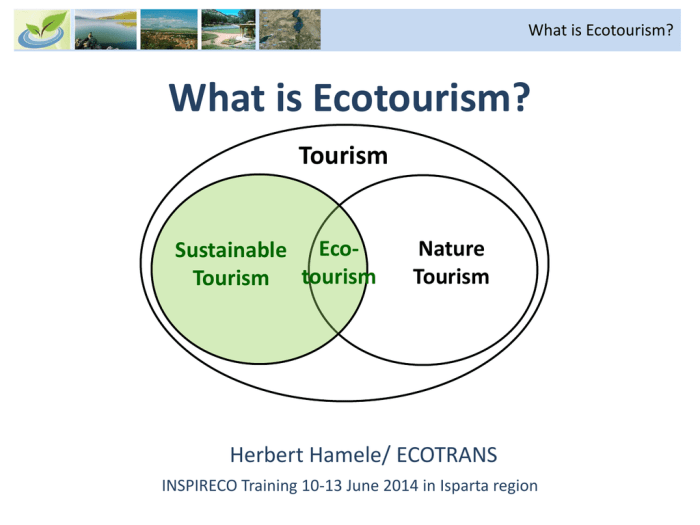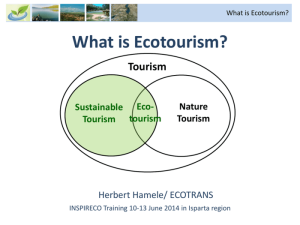
How to Plan an Ecotourism Trip sets the stage for this enthralling narrative, offering readers a glimpse into a story that is rich in detail with casual formal language style and brimming with originality from the outset.
Embark on a journey of discovery as we delve into the intricate details of planning an ecotourism trip, exploring the depths of sustainable travel and conservation efforts.
Introduction to Ecotourism
Ecotourism is a form of tourism that focuses on responsible travel to natural areas, conserving the environment, and improving the well-being of local people. It promotes sustainability, educates travelers about local cultures and ecosystems, and supports conservation efforts.
Importance of Ecotourism in Preserving the Environment
Ecotourism plays a crucial role in preserving the environment by minimizing the negative impacts of traditional tourism activities. It helps protect biodiversity, promotes the conservation of natural habitats, and encourages sustainable practices such as recycling, energy efficiency, and waste reduction.
Popular Ecotourism Destinations Around the World
- Costa Rica: Known for its rich biodiversity, Costa Rica offers ecotourism opportunities such as rainforest hikes, wildlife watching, and sustainable lodging options.
- Galapagos Islands: These remote islands off the coast of Ecuador are a UNESCO World Heritage Site and a hotspot for eco-conscious travelers interested in exploring unique ecosystems and observing endemic species.
- Kenya: Home to diverse wildlife reserves and national parks, Kenya provides eco-friendly safari experiences that support conservation efforts and local communities.
- Iceland: With its stunning landscapes, geothermal hot springs, and commitment to sustainable tourism practices, Iceland is a popular destination for eco-minded travelers seeking outdoor adventures.
Planning Considerations
When embarking on an ecotourism trip, proper planning is essential to ensure a meaningful and sustainable experience for both the traveler and the environment. By considering key factors and choosing destinations that align with conservation efforts, you can make a positive impact while enjoying the beauty of nature.
Significance of Planning an Ecotourism Trip
Planning an ecotourism trip allows you to minimize your environmental impact, support local conservation efforts, and immerse yourself in unique natural habitats responsibly. It also helps you to choose activities that are in line with sustainable practices and engage with local communities in a meaningful way.
Key Factors to Consider when Planning an Ecotourism Trip
- Research and choose ecotourism operators or accommodations with strong environmental policies and certifications.
- Consider the transportation methods involved and opt for eco-friendly modes of travel whenever possible, such as public transport or cycling.
- Respect wildlife by observing from a distance, following designated trails, and avoiding activities that may disrupt their natural behavior.
- Support local communities by purchasing goods and services from local businesses, hiring local guides, and participating in cultural exchanges.
- Educate yourself about the destination’s conservation challenges and initiatives, and find ways to contribute positively during your visit.
Tips on Choosing Ecotourism Destinations that Align with Conservation Efforts
- Look for destinations that prioritize conservation and sustainable practices, such as national parks, wildlife reserves, or eco-lodges.
- Check if the destination has partnerships with local conservation organizations or community projects to ensure your visit directly benefits conservation efforts.
- Consider the seasonality and carrying capacity of the destination to avoid overcrowding and minimize your impact on the environment.
- Seek out opportunities for hands-on conservation activities, such as tree planting, wildlife monitoring, or beach clean-ups, to actively contribute to conservation efforts during your trip.
Researching Ecotourism Destinations

When planning an ecotourism trip, it is essential to research various destinations to find the one that aligns with your sustainability goals and interests. Here are some tips on how to research ecotourism destinations effectively.
Evaluating Sustainability Practices
To ensure that you support responsible ecotourism practices, it is crucial to evaluate the sustainability practices of ecotourism operators. Here are some ways to assess their commitment to sustainability:
- Look for certifications: Check if the ecotourism operator has certifications from reputable organizations such as Rainforest Alliance or Green Globe, which signify their dedication to sustainable practices.
- Research their initiatives: Explore the operator’s website or contact them directly to inquire about their conservation efforts, waste management practices, and community involvement.
- Read reviews: Look for feedback from previous travelers to see if the operator lives up to its sustainability claims and if they support local communities and conservation projects.
Finding Reputable Ecotourism Destinations
To find reputable ecotourism destinations that prioritize sustainability and conservation, consider the following resources:
- Ecotourism organizations: Organizations like The International Ecotourism Society (TIES) provide lists of certified ecotourism destinations that meet specific criteria for sustainability.
- Government websites: Some government websites offer information on ecotourism initiatives and destinations that promote responsible travel practices.
- Travel blogs and forums: Reading travel blogs and forums can give you insights into lesser-known ecotourism destinations that are committed to environmental protection and community development.
Eco-Friendly Accommodation Options
When planning an ecotourism trip, choosing eco-friendly accommodation is key to minimizing your environmental impact and supporting local communities. There are various types of eco-friendly accommodations available, each with its own unique benefits and sustainable practices.
Eco-Lodges
Eco-lodges are accommodations that are built using environmentally friendly materials and practices. They are often located in natural settings, such as rainforests, mountains, or near wildlife reserves. Staying in eco-lodges allows travelers to immerse themselves in nature while supporting conservation efforts and local communities.
Ecolodges
Ecolodges are similar to eco-lodges but are specifically designed to have minimal impact on the surrounding environment. These accommodations often incorporate renewable energy sources, waste reduction strategies, and conservation initiatives. By staying in ecolodges, travelers can enjoy a unique and sustainable lodging experience.
Sustainable Resorts
Sustainable resorts are larger accommodations that prioritize eco-friendly practices and community engagement. These resorts may have green certifications, such as LEED or EarthCheck, and offer a range of sustainable amenities, such as organic dining options, recycling programs, and nature-based activities. Choosing to stay in sustainable resorts can combine luxury with environmental responsibility.
Tips for Finding Eco-Friendly Accommodations
- Look for accommodations that have eco-certifications or sustainable practices in place.
- Read reviews from other eco-conscious travelers to learn about their experiences.
- Support locally-owned and operated accommodations to contribute directly to the community.
- Consider the location of the accommodation and its proximity to natural attractions or conservation areas.
- Engage with the staff to learn more about their environmental initiatives and community involvement.
Sustainable Transportation

When it comes to planning an ecotourism trip, sustainable transportation plays a crucial role in reducing the overall carbon footprint of your journey. Choosing eco-friendly transportation options and implementing practices to offset carbon emissions are essential steps towards responsible travel.
Eco-Friendly Transportation Options
- Opt for public transportation like trains or buses instead of renting a car to reduce emissions.
- Consider biking or walking tours to explore the destination, promoting a more active and environmentally friendly way of sightseeing.
- Choose hybrid or electric vehicles if renting a car is necessary, as they have lower emissions compared to traditional gasoline-powered cars.
Reducing Carbon Footprint While Traveling
- Offset your carbon footprint by participating in carbon offset programs that support renewable energy projects or reforestation efforts.
- Pack light to reduce the weight of the vehicle, leading to improved fuel efficiency and lower emissions during transportation.
- Avoid single-use plastics and disposable items while traveling to minimize waste and environmental impact.
Offsetting Carbon Emissions Through Sustainable Travel Practices
- Support eco-friendly tour operators and accommodations that prioritize sustainable practices and carbon neutrality in their operations.
- Calculate your travel carbon footprint using online calculators and make a conscious effort to offset it through donations or sustainable initiatives.
- Participate in local conservation projects or community-based tourism activities that contribute to environmental protection and preservation.
Engaging in Responsible Activities
When participating in ecotourism trips, it is crucial to engage in activities that are responsible and mindful of the environment and local communities. By respecting local cultures and traditions and minimizing our impact on the environment, we can ensure that our ecotourism experiences are truly sustainable and beneficial for all involved.
Examples of Responsible Activities
- Participating in beach clean-ups or nature conservation projects
- Supporting local artisans and businesses by purchasing handmade crafts or products
- Visiting community-based tourism initiatives to learn about local traditions and lifestyles
- Choosing guided tours led by knowledgeable local guides who promote sustainable practices
Importance of Respecting Local Cultures and Traditions
Respecting local cultures and traditions is essential in ecotourism to foster a positive relationship with the communities we visit. By honoring their way of life, customs, and beliefs, we can contribute to preserving their heritage and promoting cultural exchange.
Guidelines to Minimize Impact on the Environment
- Reduce waste by carrying a reusable water bottle, using eco-friendly products, and avoiding single-use plastics
- Stay on designated paths to protect natural habitats and wildlife
- Conserve energy by turning off lights and air conditioning when not in use
- Respect wildlife by observing from a safe distance and not feeding or touching animals
As we conclude this insightful guide on planning an ecotourism trip, remember that every step you take towards responsible travel contributes to the preservation of our planet’s natural beauty. So pack your bags, choose eco-friendly options, and immerse yourself in the wonders of ecotourism.
FAQ Summary
How can I ensure that my ecotourism trip supports local communities?
Choose accommodations and tour operators that have a proven track record of supporting local initiatives and hiring local guides.
What are some ways to minimize my environmental impact during an ecotourism trip?
Opt for eco-friendly transportation, carry reusable items, and follow guidelines such as leaving no trace behind.






